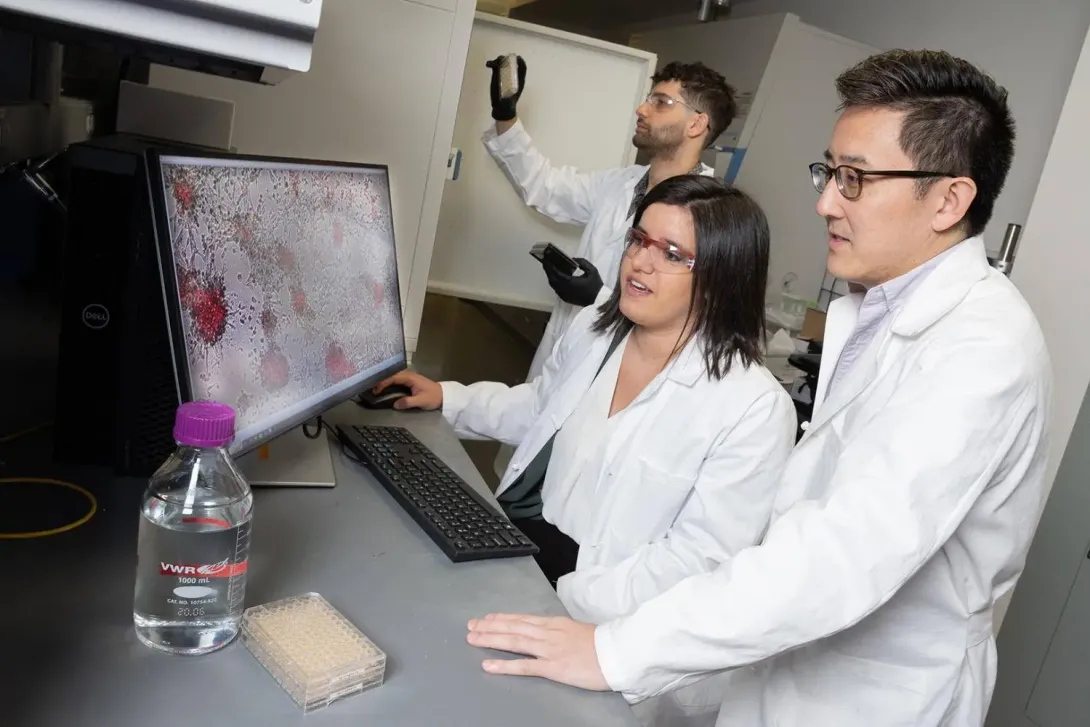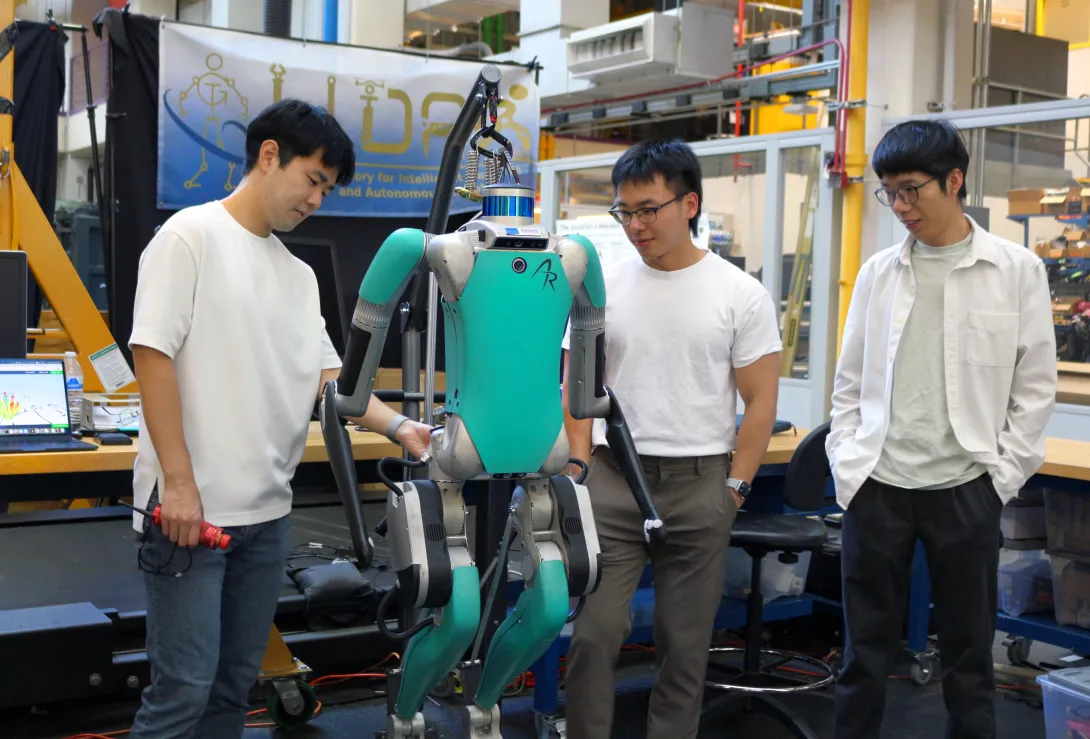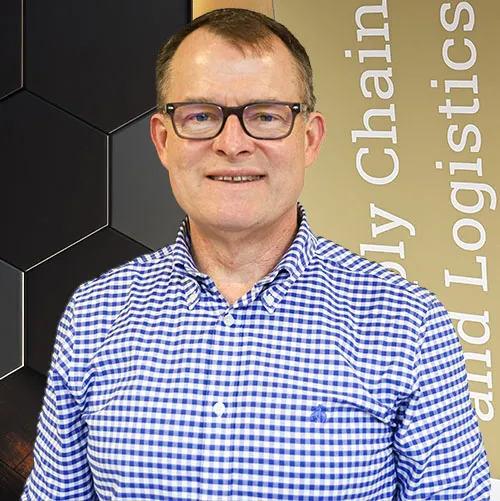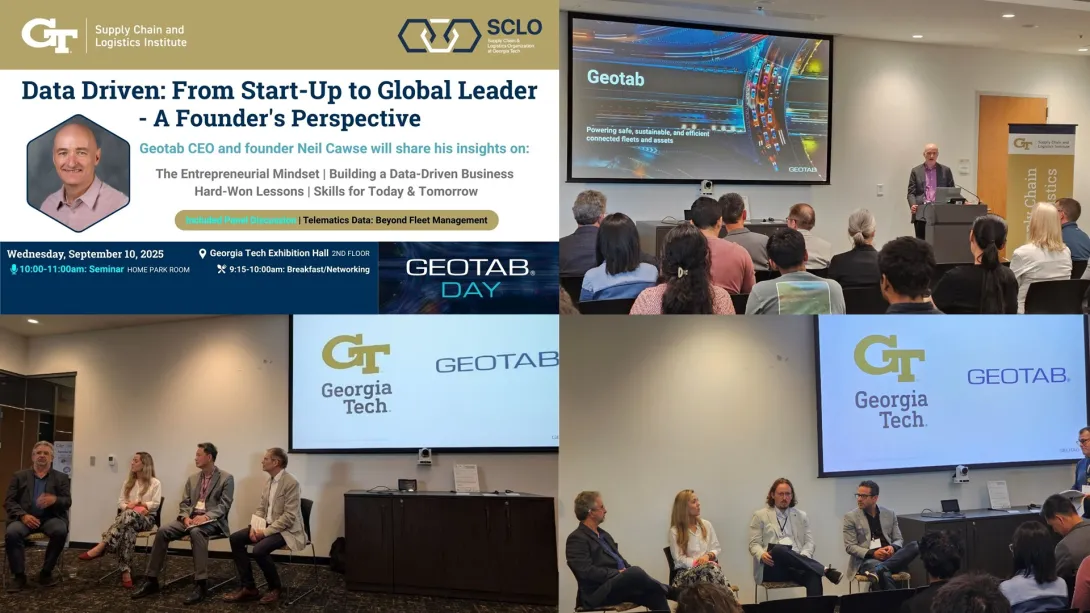Dec. 03, 2025
For decades, manufacturing has been synonymous with job creation, a pillar of economic growth and stability. Today, the industry is evolving into something far more dynamic: a hub for innovation, sustainability, and purpose-driven careers. Experts say this transformation is reshaping not only what manufacturing looks like but why it matters.
Beyond the Assembly Line: A High-Tech Reality
“People still picture manufacturing as the assembly lines of the early 20th century,” says Thomas Kurfess, executive director of the Georgia Tech Manufacturing Institute. “The reality is very different. Modern plants are among the most advanced environments you’ll find, packed with robotics, automation, and data-driven systems. In fact, if you want to see the largest number of robots in one location, it will be at an automotive assembly plant.”
That disconnect between perception and reality is one reason manufacturers struggle to fill roles despite record demand. Kurfess notes that students often overlook manufacturing careers because they assume the work is low tech. “We need to expose educators, parents, and students to what manufacturing truly looks like,” he says. Facility tours and partnerships with technical colleges can help shift the narrative.
Pinar Keskinocak, H. Milton and Carolyn J. Stewart School Chair in the School of Industrial and Systems Engineering, agrees: “Showcasing innovations like AI-driven automation, 3D printing, and smart factories is key to changing perceptions.”
Green Tech and Digital Transformation
The rise of electric vehicles, batteries, and renewable energy is accelerating this shift. “Green technology presents a transformative opportunity for U.S. manufacturing,” Kurfess explains. “It is not just about sustainability; it is about national security and global competitiveness.”
These sectors are inherently digital, says Nagi Gebraeel, Georgia Power Term Professor in the College of Engineering. “Green tech manufacturing is being built in an era when advanced digital technologies are mature and widely accessible. Factories are designed from the ground up with automation and sensing embedded, creating highly interconnected systems.”
This evolution demands new skills. The labor force must navigate environments where operational technology and information technology converge. Gebraeel predicts that by 2035, manufacturing leaders will increasingly come from operations and data-driven backgrounds rather than traditional IT.
The Workforce Challenge
Despite the promise of high-tech careers, talent pipelines remain thin. Manpreet Hora, senior associate dean in the Scheller College of Business, points to a “demand-supply mismatch” driven by rapidly changing skill requirements. “Manufacturing now needs workers who combine technical, digital, and soft skills,” he says. “Meanwhile, younger workers often gravitate toward service industries for perceived growth and tech exposure. The manufacturing sector will collectively need to reposition themselves as employers of choice by making their digital tools visible, highlighting career progression, and offering flexible learning pathways.”
Experts agree that education must adapt. Kurfess advocates for a systemwide approach starting in elementary school, while Gebraeel emphasizes integrating AI into curricula and offering modular micro-credentials for upskilling. Hora adds that hands-on training should reflect realities like AI-enabled operations and sustainability-focused processes.
Purpose and Innovation
For younger professionals seeking meaningful work, manufacturing offers more than a paycheck. “These are high-tech, high-impact roles where workers build products that move the world, from aircraft and medical devices to renewable energy systems,” Kurfess says.
To position the industry as an innovation hub, leaders must embrace technologies that enhance efficiency and quality while fostering collaboration across schools, businesses, and government. “Modernizing the image of manufacturing demands aligned messaging and shared investment,” he adds.
Looking Ahead
By 2035, experts envision a workforce fluent in AI, committed to lifelong learning, and working in environments where cyber and physical systems are seamlessly integrated. Manufacturing will remain a cornerstone of economic strength, but its true value will lie in its ability to innovate, adapt, and deliver purpose-driven careers.
Nov. 18, 2025
Scott King is the Director of Strategic Planning for One MHS (Material Handling System) at Amazon. In this role, Scott is supporting the transformation of Amazon's material handling systems to an integrated ecosystem of purpose-built equipment and intelligent software.
Prior to joining One MHS, Scott was Director of Worldwide Design and Engineering for Retail Core Fulfillment/Transportation at Amazon, where he was responsible for the design and development of global supply chain capability to support business growth across Amazon's vast network. He led critical design reviews with senior executives, effectively communicating vision, technology development roadmaps, and solutions to make compelling business cases at the VP, SVP, and CEO levels.
His expertise covers the full spectrum of Amazon's supply chain operations, including first mile facilities (transload facilities, import processing centers, and inbound cross docks), production on demand (books, disks, custom merchandise), fulfillment centers (both Amazon Robotics and traditional facilities supporting conveyable and non-conveyable products across diverse merchandise categories), air and ground transportation (ground hubs, sort centers, air hubs and air gateways), and seasonal/specialty operations (quick-deploy, returns processing, and reverse logistics).
Since joining Amazon in 2015, Scott has been influential in technological breakthroughs in robotics and AI, enabling new opportunities to broaden the types of deployable systems by using computer vision and machine learning to unlock new capabilities. He leads the development of integrated systems-of-systems that balance process optimization and intentional automation to ensure humans and technology work together safely and efficiently. During his tenure Amazon has achieved the largest deployment of industrial robotics and mechatronics on earth.
Prior to Amazon, Scott served as Project Manager and Lead Engineer for Direct Fulfillment Supply Chain at The Home Depot from 2011 to 2014, where he developed comprehensive omni-channel supply chain architecture and was recognized as Supply Chain "Leader of the Month" for his work on e-commerce facility network design and startup. Earlier in his career, he spent six years at Office Depot as Senior Manager for Engineering, Continuous Improvement, and Supply Chain, where he received the Global Innovation Award for implementing lean principles to achieve 57% cycle time reductions across the fulfillment network.
Scott holds both Bachelor's and Master's degrees from the Georgia Institute of Technology — a Bachelor of Science in Industrial Engineering (2004) and a Master of Science in Systems Engineering (2011). His graduate work included analyzing future cargo aircraft and automotive designs, supply chain network simulations, advanced supply chain robotics, and autonomous robotics integration with human systems.
As an Industrial and Systems Engineer with over 20 years of industry experience, Scott brings expertise in strategic business planning, logistics network analysis and design, automation and robotics, statistical modeling, continuous process improvement, and team leadership.
SCL appreciates Scott's participation and will leverage his extensive expertise in global supply chain design, automation, robotics, and systems engineering to help shape our strategic initiatives and provide valuable insights to our research and educational programs.
Nov. 20, 2025
Georgia Institute of Technology has been ranked 7th in the world in the 2026 Times Higher Education Interdisciplinary Science Rankings, in association with Schmidt Science Fellows. This designation underscores Georgia Tech’s leadership in research that solves global challenges.
“Interdisciplinary research is at the heart of Georgia Tech’s mission,” said Tim Lieuwen, executive vice president for Research. “Our faculty, students, and research teams work across disciplines to create transformative solutions in areas such as healthcare, energy, advanced manufacturing, and artificial intelligence. This ranking reflects the strength of our collaborative culture and the impact of our research on society.”
As a top R1 research university, Georgia Tech is shaping the future of basic and applied research by pursuing inventive solutions to the world’s most pressing problems. Whether discovering cancer treatments or developing new methods to power our communities, work at the Institute focuses on improving the human condition.
Teams from all seven Georgia Tech colleges, 11 interdisciplinary research institutes, the Georgia Tech Research Institute, Enterprise Innovation Institute, and hundreds of research labs and centers work together to transform ideas into real results.
News Contact
Angela Ayers
Nov. 18, 2025
Viral videos abound with humanoid robots performing amazing feats of acrobatics and dance but finding videos of a humanoid robot performing a common household task or traversing a new multi-terrain environment easily, and without human control, are much rarer. This is because training humanoid robots to perform these seemingly simple functions involves the need for simulation training data that lack the complex dynamics and degrees of freedom of motion that are inherent in humanoid robots.
To achieve better training outcomes with faster deployment results, Fukang Liu and Feiyang Wu, graduate students under Professor Ye Zhao from the Woodruff School of Mechanical Engineering and faculty member of the Institute for Robotics and Intelligent Machines, have published a duo of papers in IEEE Robotics and Automation Letters. This is a collaborative work with three other IRIM affiliated faculties, Profs. Danfei Xu, Yue Chen, and Sehoon Ha, as well as Prof. Anqi Wu from School of Computational Science and Engineering.
To develop more reliable motion learning for humanoid robots and enable humanoid robots to perform complex whole-body movements in the real world, Fukang led a team and developed Opt2Skill, a hybrid robot learning framework that combines model-based trajectory optimization with reinforcement learning. Their framework integrates dynamics and contacts into the trajectory planning process and generates high-quality, dynamically feasible datasets, which result in more reliable motion learning for humanoid robots and improved position tracking and task success rates. This approach shows a promising way to augment the performance and generalization of humanoid RL policies using dynamically feasible motion datasets. Incorporating torque data also improved motion stability and force tracking in contact-rich scenarios, demonstrating that torque information plays a key role in learning physically consistent and contact-rich humanoid behaviors.
While other datasets, such as inverse kinematics or human demonstrations, are valuable, they don’t always capture the dynamics needed for reliable whole-body humanoid control.” said by Fukang Liu. “With our Opt2Skill framework, we combine trajectory optimization with reinforcement learning to generate and leverage high-quality, dynamically feasible motion data. This integrated approach gives robots a richer and more physically grounded training process, enabling them to learn these complex tasks more reliably and safely for real-world deployment. - Fukang Liu
In another line of humanoid research, Feiyang established a one-stage training framework that allows humanoid robots to learn locomotion more efficiently and with greater environmental adaptability. Their framework, Learn-to-Teach (L2T), unlike traditional two-stage “teacher-student” approaches, which first train an expert in simulation and then retrain a limited-perception student, teaches both simultaneously, sharing knowledge and experiences in real time. The result of this two-way training is a 50% reduction in training data and time, while maintaining or surpassing state-of-the-art performance in humanoid locomotion. The lightweight policy learned through this process enables the lab’s humanoid robot to traverse more than a dozen real-world terrains—grass, gravel, sand, stairs, and slopes—without retraining or depth sensors.
By training an expert and a deployable controller together, we can turn rich simulation feedback into a lightweight policy that runs on real hardware, letting our humanoid adapt to uneven, unstructured terrain with far less data and hand-tuning than traditional methods. - Feiyang Wu
By the application of these training processes, the team hopes to speed the development of deployable humanoid robots for home use, manufacturing, defense, and search and rescue assistance in dangerous environments. These methods also support advances in embodied intelligence, enabling robots to learn richer, more context-aware behaviors.Additionally, the training data process can be applied to research to improve the functionality and adaptability of human assistive devices for medical and therapeutic uses.
As humanoid robots move from controlled labs into messy, unpredictable real-world environments, the key is developing embodied intelligence—the ability for robots to sense, adapt, and act through their physical bodies,” said Professor Ye Zhao. “The innovations from our students push us closer to robots that can learn robust skills, navigate diverse terrains, and ultimately operate safely and reliably alongside people. - Prof. Ye Zhao
Author - Christa M. Ernst
Citations
Liu F, Gu Z, Cai Y, Zhou Z, Jung H, Jang J, Zhao S, Ha S, Chen Y, Xu D, Zhao Y. Opt2skill: Imitating dynamically-feasible whole-body trajectories for versatile humanoid loco-manipulation. IEEE Robotics and Automation Letters. 2025 Oct 13.
Wu F, Nal X, Jang J, Zhu W, Gu Z, Wu A, Zhao Y. Learn to teach: Sample-efficient privileged learning for humanoid locomotion over real-world uneven terrain. IEEE Robotics and Automation Letters. 2025 Jul 23.
News Contact
Nov. 21, 2025
By Chris Gaffney, Managing Director, Georgia Tech Supply Chain and Logistics Institute | Supply Chain Advisor | Former Executive at Frito-Lay, AJC International, and Coca-Cola
In today's supply chain environment, the pace and scale of change are no longer episodic — they are constant. Network redesigns, automation investments, digital transformation, new product and business models, shifting customer expectations, cost pressure, and talent dynamics all converge at once.
Here is the most direct insight I can offer — and one I have come to believe deeply through experience:
“If you want your organization, automation, or Digital/AI investments to pay off, change management is not optional. It is the highest-leverage point of failure or success.”
Despite decades of innovation, the uncomfortable truth is that most large-scale supply chain transformations still fall short. According to a recent Bain survey, 70% of major transformations fail to meet their objectives — a number that has remained stubbornly consistent over time. The reasons vary, but the most common root cause is not the technology — it’s the people side of the change.
This is why change management must be treated as a leadership discipline at the center of supply chain excellence. And it is why this topic continues to rise in conversations I have with industry partners, consulting clients, and the students entering the field.
Where I First Learned the Power of Change Leadership
This isn’t an abstract subject for me — it is something I experienced in my career. When I worked at The Coca-Cola Company, the business went through multiple waves of transformation over a 10–15 year period: acquisitions and integrations, major information-system deployments, shifts in the beverage portfolio, and cultural changes as carbonated soft drink growth slowed.
As the company diversified into new beverage categories, the economics shifted and productivity expectations rose. The technical challenges were significant, but what stood out to me was this:
“The difference between transformations that succeeded and those that stalled was how effectively people were brought into the change — how well they understood it, aligned with it, and adapted to it.”
Strong technical designs struggled if people weren’t aligned. But “good enough” solutions thrived when the organization invested in communication, role clarity, and capability-building.
Later in my career, during my time as President of Coca-Cola Supply, we made one of the most durable leadership investments I’ve ever seen: certifying the entire organization in the Coca-Cola change model. Many of those leaders still apply the same principles today — 15 to 20 years later — because the skills became part of how they led, not something they had to remember.
That experience shaped how I see change leadership today.
What Today’s Supply Chain Landscape Is Telling Us
Across industries — and especially across complex supply chains — the same patterns repeat.
WMS and automation vendors now budget change management into implementation plans. They’ve learned that even well-designed systems fail if associates fear job loss or can’t visualize the “after” state of their work.
Consulting firms see adoption challenges as the biggest barrier to client success. A firm we taught recently added change management to their executive education curriculum because their teams saw change gaps in almost every engagement. Months later, that module remains the highest-value part of the course.
Network design firms observe cultural resistance across geographies. Even optimized solutions don’t transfer cleanly from one region to another. Culture, norms, and expectations matter — often more than the math.
Robotics and automation projects fail for people reasons, not engineering reasons. At the recent RoboGeorgia Forum, the keynote emphasized that a surprising percentage of large automation investments fail because of unclear roles, resistance, weak communication, and fear — not limitations in the technology.
AI adoption mirrors these challenges. According to a recent McKinsey Global AI survey, only one-third say they are scaling AI enterprise-wide, and just 39% report measurable EBIT impact. The survey reinforces that even when technology works, the real barrier is organizational readiness — leadership alignment, redesigned processes, clear governance, and a reskilled workforce — not model performance.
There is also strong evidence showing that when change leadership is done well, project outcomes dramatically improve. In a benchmarking study of more than 2,600 initiatives, Prosci found that 88% of projects with excellent change management met or exceeded their objectives, compared with only 13% of those with poor change management. Projects with excellent change management were also 5 times more likely to stay on or ahead of schedule and 1.5 times more likely to stay on or under budget. These findings reinforce a simple truth: effective change leadership is directly correlated with higher performance, better adoption, and faster time to value.
Put simply:
“Technical innovation moves faster than organizational adoption — and the gap costs time, money, and credibility.”
Why We Still Struggle With Change, Even Though We “Know Better”
Here's where a critical-thinking lens helps:
- We have 50 years of research on how change works.
- We have widely used models.
- We have entire consulting practices devoted to change.
- And most leaders have lived through multiple transformations.
So why does the gap persist?
Leaders confuse technical readiness with organizational readiness. A strong design doesn’t guarantee strong adoption.
Self-interest is underestimated. Logic rarely moves people. Personal impact does.
Urgency pressures force shortcuts. Go-live dates push leaders to cut corners on communication, training, and role clarity — the exact things that prevent failure.
Leaders assume operations teams “will adjust.” This is the most common miscalculation. Operational excellence does not automatically translate to change readiness.
These points explain the paradox: even experienced leaders underestimate the work of leading people through change.
The Two Leading Change Management Models: Kotter and ADKAR
Dozens of frameworks exist, but two stand clearly above the rest in terms of use, validation, and practical effectiveness in modern supply chain and technology environments: Kotter’s 8-Step Process and the Prosci ADKAR model.
Frameworks like Kotter and ADKAR are powerful, but they don't replace judgment. Real change leadership requires applying these tools with situational awareness, not following them mechanically.
Kotter’s 8 Steps focus on organization-wide transformation:
- Create a sense of urgency: Show why change is necessary and the potential consequences of not changing.
- Build a guiding coalition: Assemble a team with enough power and influence to lead the change effort and encourage teamwork.
- Form a strategic vision: Develop a clear vision for the future and strategies to achieve it, making it clear how things will be different.
- Communicate the change vision: Widely and often communicate the vision to get buy-in and inspire action from others.
- Empower broad-based action: Remove obstacles and barriers, such as outdated processes or resistant individuals, to enable employees to act on the vision.
- Generate short-term wins: Plan for and celebrate early successes to build momentum and prove that progress is being made.
- Consolidate gains and build on the change: Use the credibility from initial wins to tackle larger, more complex changes, and don't declare victory too early.
- Anchor new approaches in the culture: Reinforce the new behaviors, processes, and practices until they become a permanent part of the organization's culture.
ADKAR focuses on individual adoption:
- Awareness – Of the need for change
- Desire – To Participate and support the change
- Knowledge – On how to change
- Ability – To implement required skills and behaviors
- Reinforcement – To sustain the change
The synthesis:
Kotter shows leaders how to orchestrate change.
ADKAR shows leaders how to scale it through people.
Supply chain leaders benefit from understanding both.
What Supply Chain Leaders Can Do on Monday
A practical call to action for building your own change leadership muscle:
1. Run a 15-minute clarity check with your team.
Ask:
- What change is coming?
- Why is it happening?
- Who will feel it most?
- What might they fear losing?
2. Identify the two individuals most affected by the change.
Ask:
- What will their new day actually look like?
- What one action can support them?
3. Choose one communication habit and make it consistent.
Options include:
- A Friday “What’s coming next” email
- A weekly dashboard
- A Monday 10-minute huddle
4. Map one current project against Kotter or ADKAR.
- Pick a project already underway.
- Identify the missing step.
- Strengthen it.
5. Model the behaviors you want to see.
- Be the first adopter.
- Be transparent.
- Be steady.
A Personal Reflection (Full Circle)
Looking back at my time at Coca-Cola Supply, the decision to certify the entire organization in change leadership stands out as one of the smartest investments we made. It gave us a shared language and a shared discipline for supporting people through transformation.
Fifteen to twenty years later, I still see those leaders applying those principles instinctively. That’s what happens when change management becomes part of a leadership culture — a natural reflex, not a task.
My hope is that every supply chain professional, whether student or senior leader, will build this capability. Because:
“Technology will keep evolving. People will remain the center of every transformation.”
Final Thought: “Says Easy, Does Hard” — But Always Worth It
Supply chains do not succeed because of perfect plans or flawless systems. They succeed because the people who operate them understand the change, believe in it, and are supported through it.
This is a muscle worth building. And it’s one that lasts.
If You Need Support — We’re Here to Help
If your organization is navigating a transformation and wants support building these capabilities, please reach out to us at the Georgia Tech Supply Chain and Logistics Institute (SCL). We are actively working with companies across Georgia and beyond, sharing what we’ve learned and offering short, practical workshops on change leadership for supply chain teams. We’re always happy to help organizations strengthen this essential muscle.
Oct. 27, 2025
By Chris Gaffney, Managing Director, Georgia Tech Supply Chain and Logistics Institute | Supply Chain Advisor | Former Executive at Frito-Lay, AJC International, and Coca-Cola
The Moment That Changed How I Listen
When I chaired the National Product Supply Group at Coca-Cola, one of our most respected board members was Jeff Edwards. Jeff had decades of experience and commanded respect without ever seeking attention. In a four-hour meeting, Jeff might speak two or three times—never more. But when he did, everyone stopped to listen.
What made Jeff so impactful wasn’t the number of words he used—it was the care behind them. He listened intently, gathered information, built context, and added value only when his perspective would move the conversation forward. His real skill was not speaking—it was listening with purpose.
That experience stayed with me, especially because earlier in my own career, I had a very different experience. While working at AJC International, I attended a leadership program at the Center for Creative Leadership. Early in the program, a cohort of about twenty of us sat in a facilitated discussion. What we didn’t know was that we were being filmed.
Later that day, each of us reviewed our videos one-on-one with an instructor. Watching myself was humbling. I saw a young professional trying too hard to prove himself—talking far too much, jumping in before others, and dominating the conversation. It was uncomfortable to watch, but invaluable. It forced me to face how insecurity can manifest as over-talking and how much more powerful restraint and self-awareness can be. I’ve been on a "less is more" journey ever since.
Why Communication Is a Supply Chain Differentiator
We often talk about supply chain as end-to-end, but that phrase means something deeper than process visibility—it implies constant collaboration. Supply chain professionals must connect with suppliers, customers, and internal stakeholders across every function.
That means communication is the connective tissue of our profession.
- Upstream and downstream, we are translators—interpreting complex data, system logic, and network realities for people who make decisions.
- Inside organizations, we act as bridges between technical teams and commercial leaders.
- Across tiers, we negotiate, influence, and build trust with partners who don’t see what we see every day.
Even as automation expands, supply chains remain messy, human, and physical. Systems can handle the routine, but edge cases, disruptions, and exceptions still rely on judgment—and judgment relies on communication. The ability to see, listen, and convey context in real time is what keeps operations resilient when variability strikes.
In our earlier SCL articles, we wrote that skills that survive AI are the ones that emphasize human discernment—and that critical thinking is about interpreting and questioning rather than accepting data at face value. Communication is where these two intersect. It is how human understanding flows across the supply chain network.
When Communication Breaks Down
I once worked with a technically gifted colleague—let’s call him Forrest—who had deep analytical capability but struggled to speak up in group settings. His insights were sharp, but his inability to communicate them left him isolated. Eventually, he left the organization. It was a tough reminder that technical strength without communication is unrealized potential.
In a global supply chain, it’s not enough to know the answer. You have to make others understand why it’s the answer—and what to do with it. Communication is how insight becomes action.
The Many Dimensions of Communication
We tend to equate communication with speaking, but it’s much broader. Great communicators master four dimensions:
- Speaking – Conveying information clearly, concisely, and confidently.
- Writing – Capturing ideas and decisions in a way that travels across teams and time zones.
- Listening – Absorbing context before contributing, and letting others be heard.
- Observing – Seeing what others miss and using that insight to guide action.
The fourth one—observing—is often overlooked.
Recently, while reading with my granddaughter, she picked out a children’s book titled Bud Finds Her Gift. It’s about discovering one's special ability, and Bud's gift turned out to be observation—simply noticing things others missed. Watching her read that story reminded me how powerful observation really is.
I thought of my former colleague, Tim Harville, with whom I worked at Coregistics. Tim often walked the warehouse with new supervisors, teaching them to "see the operation"—to notice what looks good, what's out of place, and where waste or opportunity hides in plain sight. His goal wasn't to test them—it was to train their eyes. Observation, in that sense, is a key communication skill. You can't describe, explain, or improve what you haven't first seen clearly.
Can Communication Be Taught? Absolutely.
I’ve seen it done.
At Frito-Lay, we invested in communication training for new managers—everything from eliminating filler words to using purposeful body language and structuring messages with intent. At Coca-Cola, Toastmasters chapters gave leaders a safe space to practice public speaking, storytelling, and feedback.
And beyond formal training, there's practice in the everyday moments—taking notes in meetings, volunteering to summarize a discussion, representing a project team, or offering to speak at a class or event. Every repetition builds comfort and clarity.
My own Center for Creative Leadership experience was the beginning of that practice for me. Decades later, I still catch myself needing to slow down, listen, and wait for the right moment. The lesson never stops.
Painting the Picture: When It Works and When It’s Missing
When communication works, credibility follows. Jeff Edwards didn’t have to compete for airtime; his credibility made his words count. When it's missing, even talented people like Forrest can struggle to influence or grow.
Both extremes teach the same lesson: communication isn't about more or less—it's about meaning. It's knowing when to speak, what to say, and how to connect it to the needs of others.
Practical Ways to Build Communication Strength
- Listen to learn. Take notes, paraphrase what you've heard, and confirm understanding
- Translate technical into practical. Explain what data means for the business, not just what it shows.
- Observe before you act. Practice "seeing" your operation or process with fresh eyes.
- Simplify your writing. Clarity beats cleverness every time.
- Seek feedback. Ask trusted peers to tell you how your communication lands.
- Prepare with intent. Know your audience, outcome, and key message before you speak.
Reflection Questions
- Where in my current role does communication make or break outcomes?
- When was the last time I adjusted how I communicate to fit my audience?
- Do I listen more than I speak—and what might I learn if I did?
- How can I model communication that builds understanding rather than winning airtime?
Closing Thought
Technical skills and analytics may earn you a seat at the table, but communication determines whether your ideas move the organization forward.
In a world of AI, automation, and constant change, the ability to listen, observe, and translate context into action remains our most human—and most valuable—differentiator.
Oct. 07, 2025
Imagine if building new medicines or sustainable materials were as straightforward as snapping together LEGO® bricks. That’s the goal of a new project led by the Georgia Institute of Technology that could help transform the future of biomanufacturing.
The project, headed by Professor Mark Styczynski in Georgia Tech’s School of Chemical and Biomolecular Engineering (ChBE@GT), recently received a $9.2 million grant from the National Science Foundation Directorate for Technology, Innovation and Partnerships (NSF TIP) to accelerate the adoption of cell-free systems in biomanufacturing.
Promising Technology
Biotechnology has largely relied on living cells for production of products such as medicines, fragrances, or renewable fuels. But working with living cells can be complex and expensive.
Cell-free systems, by contrast, strip biology down to its essential parts, the enzymes and molecules that carry out life’s chemical reactions. This can simplify and speed up biomanufacturing, making it easier to scale.
The challenge, Styczynski explained, is that most cell-free projects still require custom-built setups. “Right now, engineering biology is like reinventing the wheel for every application,” he said. “You have to figure out how all the parts fit together each time. We want to change that by making ready-to-use modules that work right out of the box.”
Styczynski’s project, called Meta-PURE (PUrified Recombinant Elements), will create eight standardized modules, each designed for a key function in cell-free systems, such as generating energy, producing proteins, or assembling complex molecules.
“Like interchangeable puzzle pieces, these modules can be mixed and matched to support different applications,” Styczynski said.
Demonstrating Uses
His team will demonstrate the system’s versatility by producing santalene (a plant-derived fragrance used widely in consumer products), GamS protein (a tool that can improve cell-free processes), and a bacteriophage (a virus that can be safely used in research and the development of new therapeutic treatments).
These examples highlight the technology’s potential across industries ranging from pharmaceuticals and agriculture to chemicals and sustainable materials.
“We want to make these tools so that someone in industry can create their molecule or product more quickly and efficiently, and get it out the door,” Styczynski said.
“Right now, cell-free systems are mostly limited to high-value products because the cost is too high. The goal is to drive costs down and productivity up, so we can move closer to commodity chemicals like biofuels or monomers for polymers, not just niche applications. One of our partners recently developed a butanol process that shows where this can go,” he said.
NSF Initiative
Styczynski’s team is one of four recently awarded an inaugural investment of $32.4 million to help grow the U.S. bioeconomy. The initiative is called the NSF Advancing Cell-Free Systems Toward Increased Range of Use-Inspired Applications (NSF CFIRE).
“NSF is resolute in our commitment to advancing breakthroughs in biotechnology, advanced manufacturing, and other key technologies of significance to the U.S. economy,” said Erwin Gianchandani, assistant director for NSF TIP. “The novel approaches from these four CFIRE teams will speed up and expand the adoption of cell-free systems across a variety of industries and ensure America’s competitive position in the global bioeconomy.”
Collaborative Effort
While ChBE@GT is the lead, Meta-PURE is a broad collaboration with partners across academia, industry, and government. Co-principal investigators include Paul Opgenorth, co-founder and vice president of development at the biotech firm eXoZymes; Nicholas R. Sandoval, associate professor of Tulane University’s Department of Chemical and Biomolecular Engineering; and Anton Jackson-Smith, founder of the biotech startup b.next.
Meta-PURE will also train graduate students and postdocs in partnership with industry, government, and other universities, helping prepare trainees to be the future of a highly interdisciplinary U.S. bioeconomy. The team will also engage the scientific community on the implementation of metrics and standards in cell-free biotechnology to better facilitate broad adoption and interoperability of not just the results of the Meta-PURE project, but of cell-free efforts more broadly.
News Contact
Brad Dixon, braddixon@gatech.edu
Sep. 25, 2025
The question raises a sense of caution and thrill for most of us: how is Artificial Intelligence (AI) changing your workplace, and how can you harness this potential? Nowhere is this more real than in the field of logistics and supply chain management. At Georgia Tech’s Savannah campus, a component of the College of Lifetime Learning, the September 4 seminar “Unlocking GenAI in the Supply Chain: From Curiosity to Capability” brought together industry leaders and other community members to address these issues.
“Saving 10 hours a week with GenAI tools and techniques? That attracts leaders in this field,” said Chris Gaffney, Managing Director of the Supply Chain and Logistics Institute (SCL) and presenter of the seminar. “But they also seek deeper expertise that addresses what leaders need to know now about AI, including prompting as a strategic skill, AI policy implications for both students and companies, and real examples of how GenAI can move the needle on decision speed and quality.”
Gaffney is also the Edenfield Executive-in-Residence and a Professor of the Practice in Georgia Tech’s H. Milton Stewart School of Industrial and Systems Engineering.
The free seminar was part of a regular “Learners and Leaders” series, which usually meets before work over breakfast. The interactive session began by defining confusing terms in AI and the significance of its rapid development, then focused on use cases and strategies. It presented emerging trends and a new Advanced Analytics Learning Ladder, an actionable guide to training teams in AI.
Georgia Tech-Savannah, an educational outreach arm of Georgia Tech to the Coastal Empire of Georgia and beyond provides a range of learning experiences, including education for veterans, K12 STEAM enrichment and outreach, leadership training, OSHA training, and more.
It is also home to the region's Enterprise Innovation Institute's office for the Advanced Technology Development Center (ATDC), the Georgia Tech Manufacturing Extension Partnership (GaMEP), and Georgia Tech’s regional presence for Apex Accelerator.
In a recent applied research partnership, the Georgia Ports Authority along with Georgia Tech experts from the GT Supply Chain and Logistics Institute (led by Gaffney) showed through research that routing Asia cargo through the Port of Savannah delivers lower costs, greater reliability, and comparable transit times versus West Coast ports.
This Learners and Leaders seminar series responds to regional needs and offers practical strategies and solutions to workplace or educational challenges. This includes the supply and logistics sector, predominant in the Savannah region, but also extends to other topics like K-12 education, safety and health, workforce demands, etc. Among more than 110 attendees in September (face-to-face and online) were representatives of the largest regional companies, the Georgia Ports Authority, local universities, and local economic development authorities.
Georgia Tech-Savannah plays a vital role in the College of Lifetime Learning efforts to address the needs of learners in timely and meaningful ways that help the workforce remain agile, capable, and engaged.
News Contact
Kerry Jarvis
Sep. 20, 2025
Congratulations to postdoctoral researcher Jiaqi Wang, recipient of a prestigious 2025 Best Paper Award from the Freight Transportation and Logistics Special Interest Group of the INFORMS Transportation Science & Logistics Society, for his paper titled “D-Optimal Orienteering for Post-Earthquake Reconnaissance Planning.” Wang is working under the supervision of Georgia Tech Supply Chain and Logistics Institute affiliated faculty member Professor Weijun Xie.
Award Recognition
This year, the committee received 39 exceptional submissions, resulting in a highly competitive selection process. After two rigorous rounds of voting, only three papers were selected to receive awards, highlighting the exceptional quality of Wang's research.
Groundbreaking Research Impact
The focus of the research tackles a critical real-world problem: how emergency response teams can efficiently assess earthquake damage when resources are limited. In the chaotic aftermath of a major earthquake, inspection teams must quickly determine which buildings are safe and which pose risks to public safety.
The authors transformed this challenge into an innovative vehicle routing optimization problem. Unlike traditional routing that simply moves vehicles from point to point, their approach strategically deploys inspection teams to collect the highest-quality damage assessment data possible.
Technical Innovation
The team developed advanced mathematical methods that measure data quality using sophisticated criteria, ensuring every inspection contributes maximum value to emergency response planning. They validated their methodology through realistic case studies using cutting-edge earthquake simulation technology, proving their system can significantly improve disaster response efficiency.
About the Organization
The INFORMS Transportation Science & Logistics Freight Transportation and Logistics Group focuses on research spanning trucking, rail, shipping, air cargo, and intermodal transportation. Their work encompasses planning, real-time control, pricing, demand management, and risk analysis across global supply chains.
Sep. 15, 2025
Geotab Inc. (“Geotab”), a global leader in connected vehicle solutions and asset management, today announced a significant research investment of up to $223,000 (USD) to support a doctoral project at Georgia Tech. This funding will specifically enable PhD students to work alongside Geotab staff, tackling real-world challenges in understanding traffic patterns and improving road safety, by leveraging Geotab’s advanced data and AI capabilities.
Geotab and Georgia Tech have formalized their collaboration through a Master Agreement, facilitating joint research initiatives between Geotab teams and Georgia Tech faculty and their students. This strategic partnership emphasizes knowledge transfer and practical outcomes.
Pagination
- 1 Page 1
- Next page












